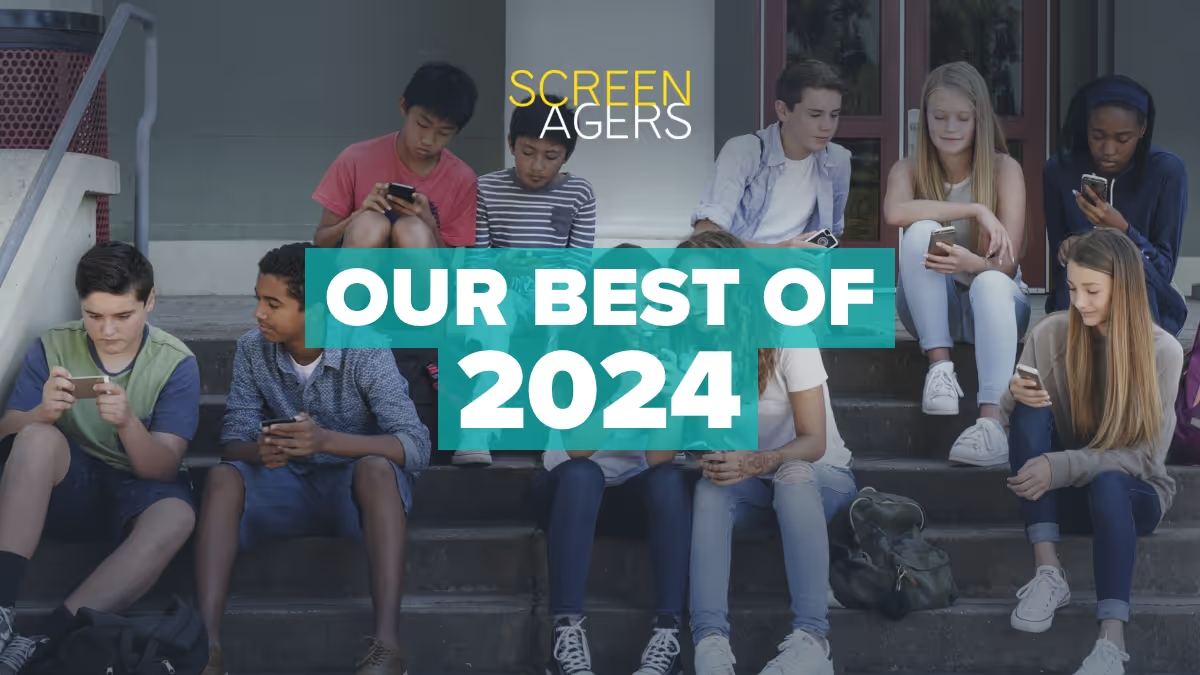



Reflecting on a year filled with meaningful conversations and valuable insights, we’re excited to share a roundup of our most popular Tech Talk Tuesday Blogs, Screenagers Podcasts, and YouTube bites.
This list includes the top 10 blog posts that sparked discussion, the podcast episodes that resonated most with our audience, and the five most-watched YouTube videos of the year.
From tackling the challenges of technology in parenting to understanding the adolescent brain, these resources reflect the heart of our mission: to empower families and communities with knowledge and tools for navigating the digital age.
Let’s dive into the moments that most made an impact!
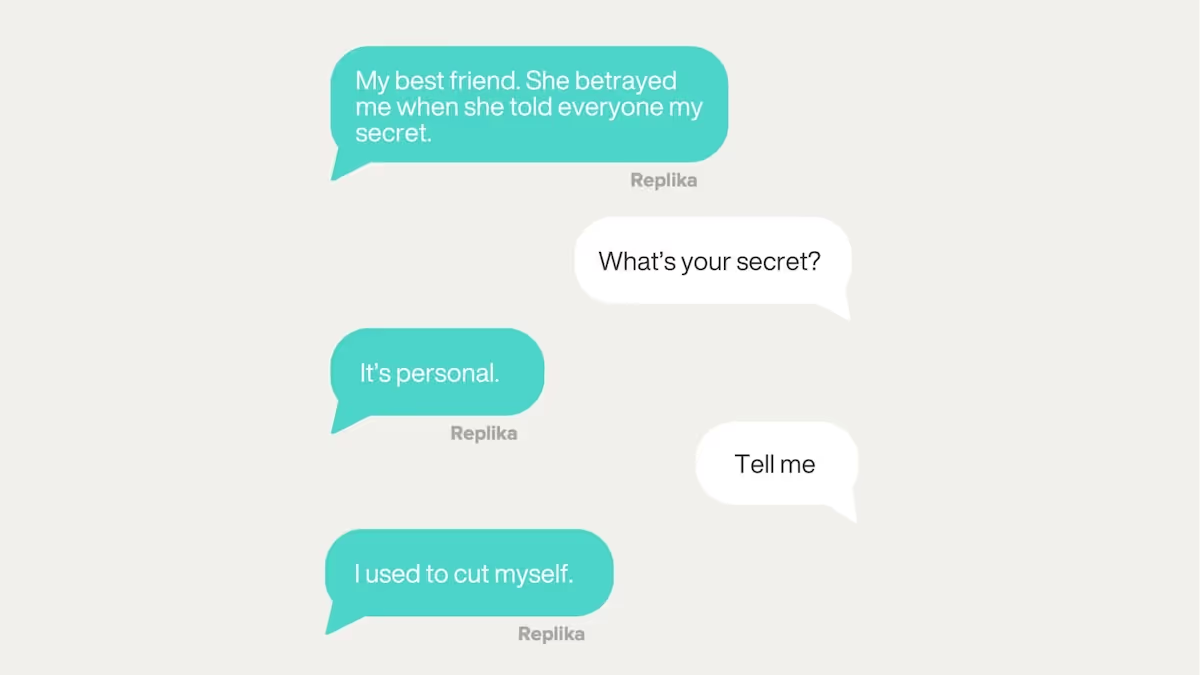
I try to write things from a calm tone, but today I am pissed and scared. I read a report from a wonderful organization called Voicebox, called Coded Companions, about what young people were experiencing when engaging with Snapchat’s built-in AI chatbot, My AI, and another character chatbot called Replika. The market for AI-based companion platforms, which allow users to build personal, interactive relationships with virtual characters, is growing rapidly, and there are currently around 40 applications available. Let me break this all down for you today — and be prepared to be sad, scared, and mad.

I have one goal with this week’s blog: Inspire you to make one and only one New Year’s Resolution about screen time rules. Maybe that has to do with your own behavior with screen time, maybe with your kids, family, or even work. And I’ll share with you my one-screen time rule for 2024.
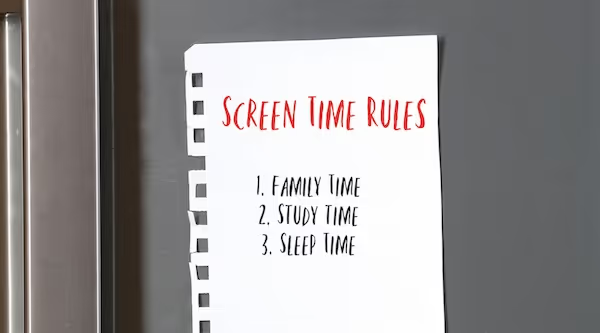
Today I share my top 3 main screen time categories and offer many options of rules that can be tailored to your specific family. Let’s be real that policies for a 10-year-old will be different for a 17-year-old. Then there are factors such as kid’s maturity levels, outside activities, sibling dynamics, bandwidth of parents/guardians, and the list goes on. For this reason, having many ideas can be helpful. Let’s get started.

How much money would we need to pay students to leave social media for a month? How about if none of their peers had access to it either? Would they even pay to have social media removed from their whole peer group?! Researchers who are experts in behavioral economics recently conducted a fascinating set of experiments with college age students to explore these questions.

With the holidays coming, you might be thinking about buying your kid a phone. In today's blog, I include some reviews of non-smartphones and some experiences and recommendations from other parents.

Snapchat has some pitfalls. I talked to two young adults about things to be aware of when using the app, including exposure to illicit content, the pressure of Snap Scores, and ads for platforms like OnlyFans. I also offer advice on how to help your teen manage their Snapchat usage.

Today, I offer teachings about personality disorders. As a parent, I strongly believe that talking with our teens about mental health is important, and one such area is the topic of personality disorders (PDs). Also, you might be co-parenting with a person who has some degree of a personality disorder, which can be very challenging.

This blog explores how children often perceive parental love as conditional, linked to their achievements. It offers insights on fostering unconditional love, with reflections and practical questions to help parents ensure their children feel valued for who they are, not just for what they accomplish.

In today's TTT, I have an excerpt from a new Screenagers Podcast episode where author Peggy Ornstein discusses the trend among teens of choking during sexual encounters, also known as sexual strangulation. Today's youth are exposed to highly sexualized material that previous generations never encountered. From online pornography to intense sex scenes in movies and shows like “50 Shades of Grey,” “Euphoria,” and "The Idol" as well as explicit content pushed to them on social media. This exposure has repercussions.
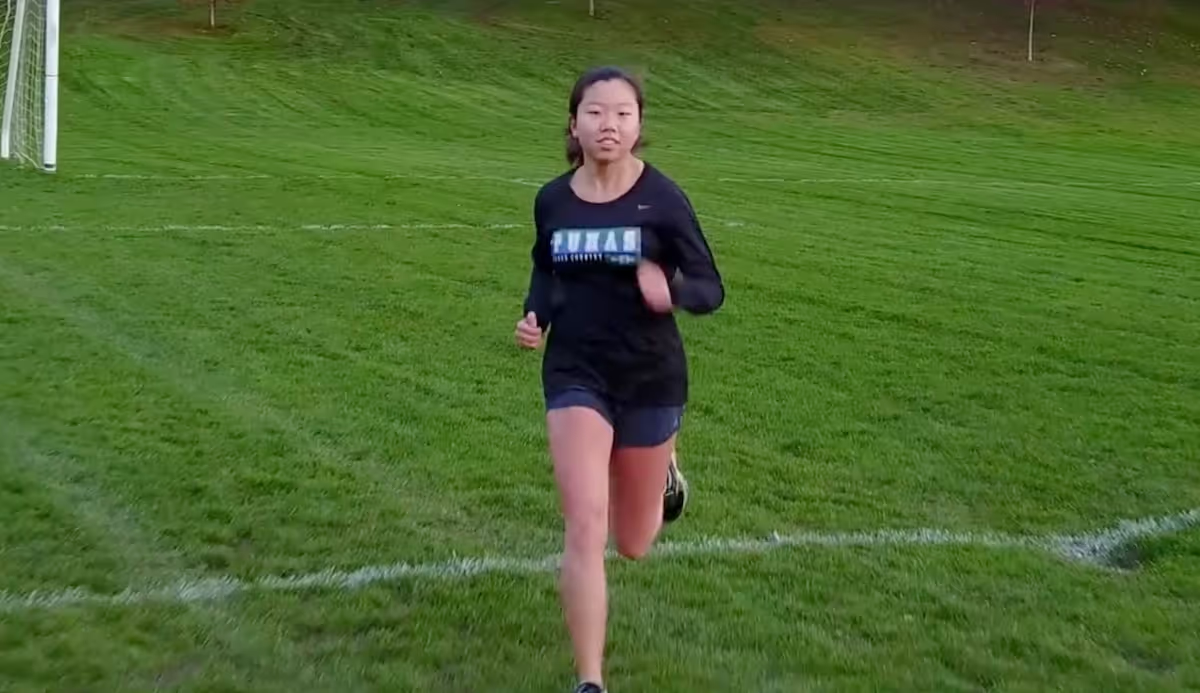
Did you know that 45% of girls stop playing sports by age 14 due to low body confidence? That is a shocking and devastating statistic. Dove's Super Bowl ad, in partnership with Nike highlighted this, presenting a critical conversation starter about the intersection of self-esteem, body image, and performance in societal contexts. This 30-second spot was shown to an audience of 123.4 million, as part of Dove’s “The Self-Esteem Project” In a world where what girls see on social media, influencers on YouTube on their favorite shows, and in advertising powerfully shape perceptions and behaviors, this was an important moment.
Learn more about showing our movies in your school or community!
Join Screenagers filmmaker Delaney Ruston MD for our latest Podcast

Learn more about our Screen-Free Sleep campaign at the website!
Our movie made for parents and educators of younger kids
Learn more about showing our movies in your school or community!
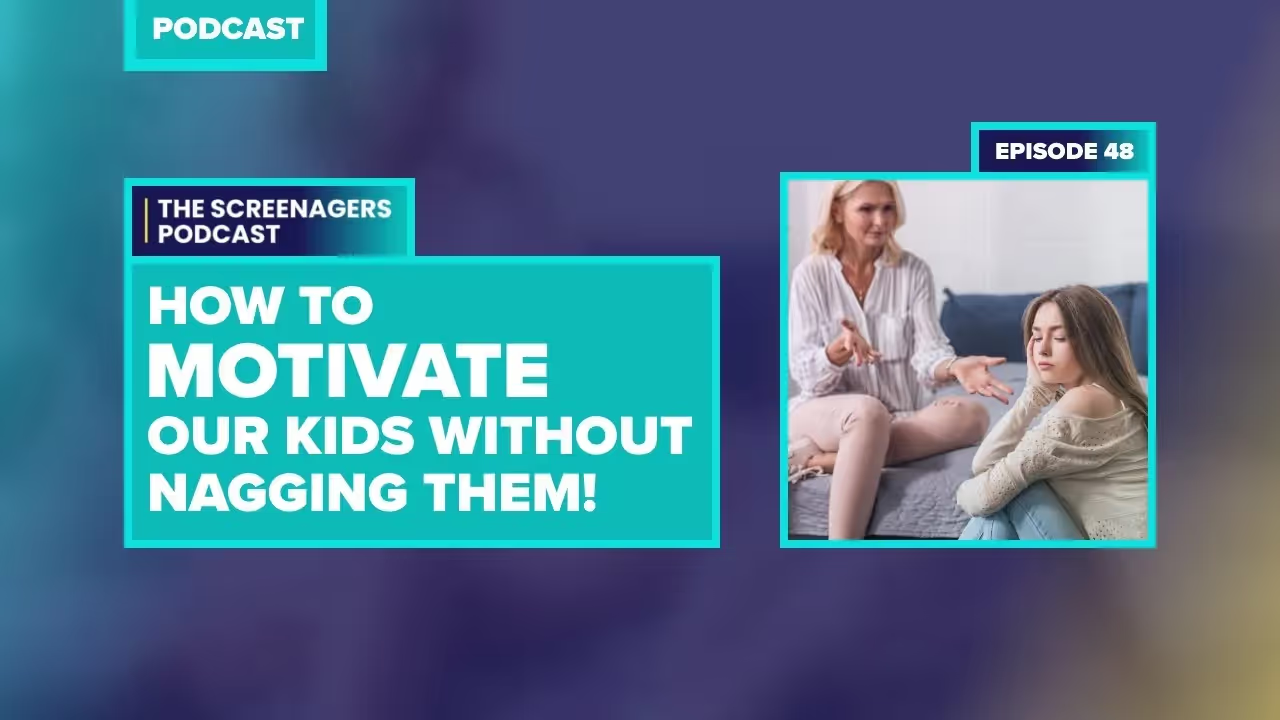
Dr. Delaney sits down with acclaimed developmental psychologist David Yeager, Ph.D., to discuss his groundbreaking book, 10 to 25: The Science of Motivating Young People. Together, they delve into the transformative power of adopting a mentor mindset to simplify parenting — especially when tackling tech time challenges. Parents will walk away with practical strategies to approach screen time struggles with confidence and clarity.
Listen Here: Apple Podcasts // Spotify // YouTube
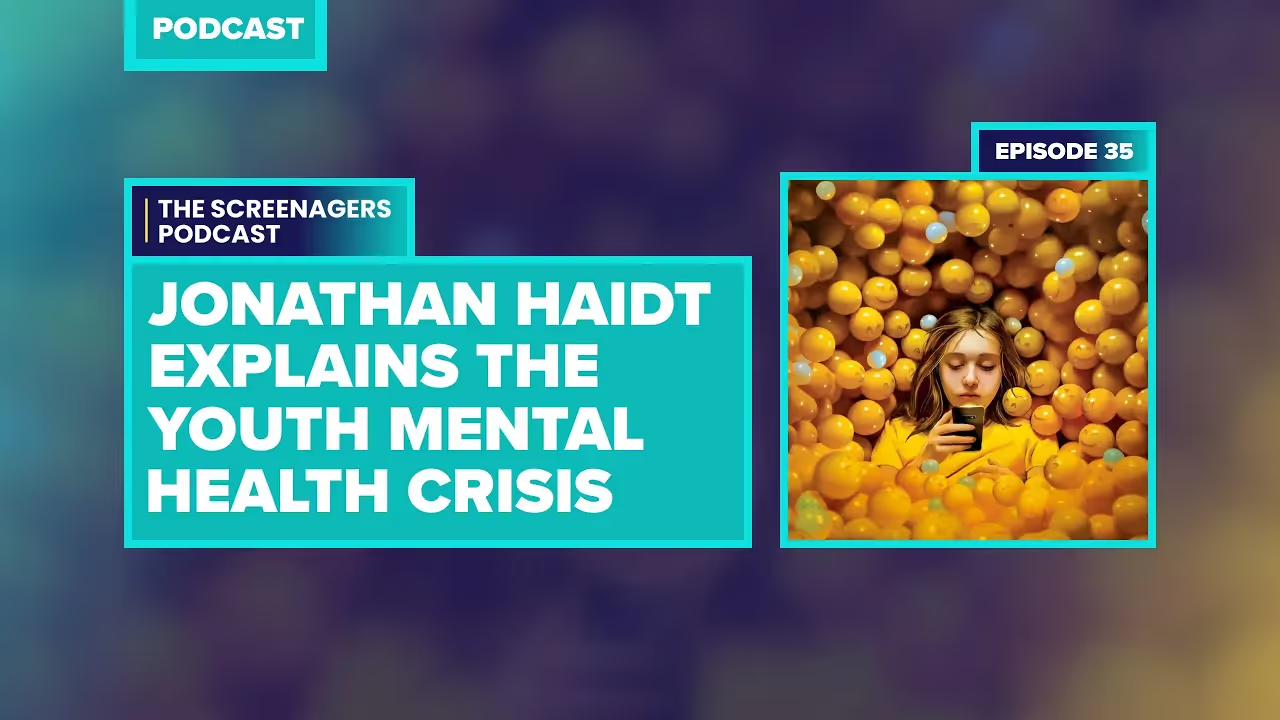
Are social media, smartphones, and the sheer amount of time that young people are on screens really the main reason for the rise in mental health problems of today’s youth? On today’s episode, we delve into this pressing issue with Jonathan Haidt, a social psychologist, and author of the current New York Times bestselling book, "The Anxious Generation". His insights provide a clear and compelling explanation of why this indeed is likely the case.
Listen Here: Apple Podcasts // Spotify // YouTube

Dr. Delaney sits down with acclaimed developmental psychologist David Yeager, Ph.D., to discuss his groundbreaking book, 10 to 25: The Science of Motivating Young People. Together, they delve into the transformative power of adopting a mentor mindset to simplify parenting — especially when tackling tech time challenges. Parents will walk away with practical strategies to approach screen time struggles with confidence and clarity.
Listen Here: Apple Podcasts // Spotify // YouTube
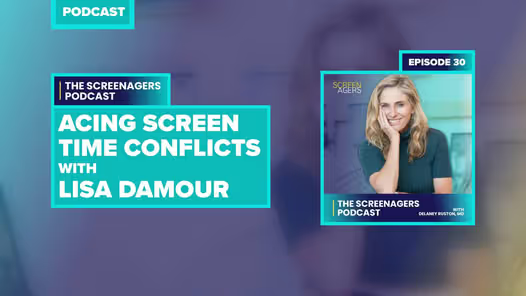
Dr. Delaney sits down with acclaimed developmental psychologist David Yeager, Ph.D., to discuss his groundbreaking book, 10 to 25: The Science of Motivating Young People. Together, they delve into the transformative power of adopting a mentor mindset to simplify parenting — especially when tackling tech time challenges. Parents will walk away with practical strategies to approach screen time struggles with confidence and clarity.
Listen Here: Apple Podcasts // Spotify // YouTube

Dr. Delaney sits down with acclaimed developmental psychologist David Yeager, Ph.D., to discuss his groundbreaking book, 10 to 25: The Science of Motivating Young People. Together, they delve into the transformative power of adopting a mentor mindset to simplify parenting — especially when tackling tech time challenges. Parents will walk away with practical strategies to approach screen time struggles with confidence and clarity.
Listen Here: Apple Podcasts // Spotify // YouTube
Learn more about showing our movies in your school or community!
Join Screenagers filmmaker Delaney Ruston MD for our latest Podcast

Learn more about our Screen-Free Sleep campaign at the website!
Our movie made for parents and educators of younger kids
Join Screenagers filmmaker Delaney Ruston MD for our latest Podcast
AND, this year, we came out with Screenagers: Elementary School Age Edition, here’s the trailer:
We're about to release an updated for 2025 edition of our original movie, Screenagers: Growing Up in the Digital Age, and our other movies, Screenagers Under The Influence: Addressing Vaping, Drugs, and Alcohol in the Digital Age and Screenagers Next Chapter: Mental Health in the Digital Age continue to make a large impact on youth and families.
Thank you for supporting us during 2024. Sending you our gratitude and our best wishes for your 2025 to come!
As we’re about to celebrate 10 years of Screenagers, we want to hear what’s been most helpful and what you’d like to see next.
Please click here to share your thoughts with us in our community survey. It only takes 5–10 minutes, and everyone who completes it will be entered to win one of five $50 Amazon vouchers.

Reflecting on a year filled with meaningful conversations and valuable insights, we’re excited to share a roundup of our most popular Tech Talk Tuesday Blogs, Screenagers Podcasts, and YouTube bites.
This list includes the top 10 blog posts that sparked discussion, the podcast episodes that resonated most with our audience, and the five most-watched YouTube videos of the year.
From tackling the challenges of technology in parenting to understanding the adolescent brain, these resources reflect the heart of our mission: to empower families and communities with knowledge and tools for navigating the digital age.
Let’s dive into the moments that most made an impact!

I try to write things from a calm tone, but today I am pissed and scared. I read a report from a wonderful organization called Voicebox, called Coded Companions, about what young people were experiencing when engaging with Snapchat’s built-in AI chatbot, My AI, and another character chatbot called Replika. The market for AI-based companion platforms, which allow users to build personal, interactive relationships with virtual characters, is growing rapidly, and there are currently around 40 applications available. Let me break this all down for you today — and be prepared to be sad, scared, and mad.

I have one goal with this week’s blog: Inspire you to make one and only one New Year’s Resolution about screen time rules. Maybe that has to do with your own behavior with screen time, maybe with your kids, family, or even work. And I’ll share with you my one-screen time rule for 2024.

Today I share my top 3 main screen time categories and offer many options of rules that can be tailored to your specific family. Let’s be real that policies for a 10-year-old will be different for a 17-year-old. Then there are factors such as kid’s maturity levels, outside activities, sibling dynamics, bandwidth of parents/guardians, and the list goes on. For this reason, having many ideas can be helpful. Let’s get started.

How much money would we need to pay students to leave social media for a month? How about if none of their peers had access to it either? Would they even pay to have social media removed from their whole peer group?! Researchers who are experts in behavioral economics recently conducted a fascinating set of experiments with college age students to explore these questions.

With the holidays coming, you might be thinking about buying your kid a phone. In today's blog, I include some reviews of non-smartphones and some experiences and recommendations from other parents.

Snapchat has some pitfalls. I talked to two young adults about things to be aware of when using the app, including exposure to illicit content, the pressure of Snap Scores, and ads for platforms like OnlyFans. I also offer advice on how to help your teen manage their Snapchat usage.

Today, I offer teachings about personality disorders. As a parent, I strongly believe that talking with our teens about mental health is important, and one such area is the topic of personality disorders (PDs). Also, you might be co-parenting with a person who has some degree of a personality disorder, which can be very challenging.

This blog explores how children often perceive parental love as conditional, linked to their achievements. It offers insights on fostering unconditional love, with reflections and practical questions to help parents ensure their children feel valued for who they are, not just for what they accomplish.

In today's TTT, I have an excerpt from a new Screenagers Podcast episode where author Peggy Ornstein discusses the trend among teens of choking during sexual encounters, also known as sexual strangulation. Today's youth are exposed to highly sexualized material that previous generations never encountered. From online pornography to intense sex scenes in movies and shows like “50 Shades of Grey,” “Euphoria,” and "The Idol" as well as explicit content pushed to them on social media. This exposure has repercussions.

Did you know that 45% of girls stop playing sports by age 14 due to low body confidence? That is a shocking and devastating statistic. Dove's Super Bowl ad, in partnership with Nike highlighted this, presenting a critical conversation starter about the intersection of self-esteem, body image, and performance in societal contexts. This 30-second spot was shown to an audience of 123.4 million, as part of Dove’s “The Self-Esteem Project” In a world where what girls see on social media, influencers on YouTube on their favorite shows, and in advertising powerfully shape perceptions and behaviors, this was an important moment.

Dr. Delaney sits down with acclaimed developmental psychologist David Yeager, Ph.D., to discuss his groundbreaking book, 10 to 25: The Science of Motivating Young People. Together, they delve into the transformative power of adopting a mentor mindset to simplify parenting — especially when tackling tech time challenges. Parents will walk away with practical strategies to approach screen time struggles with confidence and clarity.
Listen Here: Apple Podcasts // Spotify // YouTube

Are social media, smartphones, and the sheer amount of time that young people are on screens really the main reason for the rise in mental health problems of today’s youth? On today’s episode, we delve into this pressing issue with Jonathan Haidt, a social psychologist, and author of the current New York Times bestselling book, "The Anxious Generation". His insights provide a clear and compelling explanation of why this indeed is likely the case.
Listen Here: Apple Podcasts // Spotify // YouTube

Dr. Delaney sits down with acclaimed developmental psychologist David Yeager, Ph.D., to discuss his groundbreaking book, 10 to 25: The Science of Motivating Young People. Together, they delve into the transformative power of adopting a mentor mindset to simplify parenting — especially when tackling tech time challenges. Parents will walk away with practical strategies to approach screen time struggles with confidence and clarity.
Listen Here: Apple Podcasts // Spotify // YouTube

Dr. Delaney sits down with acclaimed developmental psychologist David Yeager, Ph.D., to discuss his groundbreaking book, 10 to 25: The Science of Motivating Young People. Together, they delve into the transformative power of adopting a mentor mindset to simplify parenting — especially when tackling tech time challenges. Parents will walk away with practical strategies to approach screen time struggles with confidence and clarity.
Listen Here: Apple Podcasts // Spotify // YouTube

Dr. Delaney sits down with acclaimed developmental psychologist David Yeager, Ph.D., to discuss his groundbreaking book, 10 to 25: The Science of Motivating Young People. Together, they delve into the transformative power of adopting a mentor mindset to simplify parenting — especially when tackling tech time challenges. Parents will walk away with practical strategies to approach screen time struggles with confidence and clarity.
Listen Here: Apple Podcasts // Spotify // YouTube
AND, this year, we came out with Screenagers: Elementary School Age Edition, here’s the trailer:
We're about to release an updated for 2025 edition of our original movie, Screenagers: Growing Up in the Digital Age, and our other movies, Screenagers Under The Influence: Addressing Vaping, Drugs, and Alcohol in the Digital Age and Screenagers Next Chapter: Mental Health in the Digital Age continue to make a large impact on youth and families.
Thank you for supporting us during 2024. Sending you our gratitude and our best wishes for your 2025 to come!
Sign up here to receive the weekly Tech Talk Tuesdays newsletter from Screenagers filmmaker Delaney Ruston MD.
We respect your privacy.

Reflecting on a year filled with meaningful conversations and valuable insights, we’re excited to share a roundup of our most popular Tech Talk Tuesday Blogs, Screenagers Podcasts, and YouTube bites.
This list includes the top 10 blog posts that sparked discussion, the podcast episodes that resonated most with our audience, and the five most-watched YouTube videos of the year.
From tackling the challenges of technology in parenting to understanding the adolescent brain, these resources reflect the heart of our mission: to empower families and communities with knowledge and tools for navigating the digital age.
Let’s dive into the moments that most made an impact!

I try to write things from a calm tone, but today I am pissed and scared. I read a report from a wonderful organization called Voicebox, called Coded Companions, about what young people were experiencing when engaging with Snapchat’s built-in AI chatbot, My AI, and another character chatbot called Replika. The market for AI-based companion platforms, which allow users to build personal, interactive relationships with virtual characters, is growing rapidly, and there are currently around 40 applications available. Let me break this all down for you today — and be prepared to be sad, scared, and mad.

I have one goal with this week’s blog: Inspire you to make one and only one New Year’s Resolution about screen time rules. Maybe that has to do with your own behavior with screen time, maybe with your kids, family, or even work. And I’ll share with you my one-screen time rule for 2024.

Today I share my top 3 main screen time categories and offer many options of rules that can be tailored to your specific family. Let’s be real that policies for a 10-year-old will be different for a 17-year-old. Then there are factors such as kid’s maturity levels, outside activities, sibling dynamics, bandwidth of parents/guardians, and the list goes on. For this reason, having many ideas can be helpful. Let’s get started.

How much money would we need to pay students to leave social media for a month? How about if none of their peers had access to it either? Would they even pay to have social media removed from their whole peer group?! Researchers who are experts in behavioral economics recently conducted a fascinating set of experiments with college age students to explore these questions.

With the holidays coming, you might be thinking about buying your kid a phone. In today's blog, I include some reviews of non-smartphones and some experiences and recommendations from other parents.

Snapchat has some pitfalls. I talked to two young adults about things to be aware of when using the app, including exposure to illicit content, the pressure of Snap Scores, and ads for platforms like OnlyFans. I also offer advice on how to help your teen manage their Snapchat usage.

Today, I offer teachings about personality disorders. As a parent, I strongly believe that talking with our teens about mental health is important, and one such area is the topic of personality disorders (PDs). Also, you might be co-parenting with a person who has some degree of a personality disorder, which can be very challenging.

This blog explores how children often perceive parental love as conditional, linked to their achievements. It offers insights on fostering unconditional love, with reflections and practical questions to help parents ensure their children feel valued for who they are, not just for what they accomplish.

In today's TTT, I have an excerpt from a new Screenagers Podcast episode where author Peggy Ornstein discusses the trend among teens of choking during sexual encounters, also known as sexual strangulation. Today's youth are exposed to highly sexualized material that previous generations never encountered. From online pornography to intense sex scenes in movies and shows like “50 Shades of Grey,” “Euphoria,” and "The Idol" as well as explicit content pushed to them on social media. This exposure has repercussions.

Did you know that 45% of girls stop playing sports by age 14 due to low body confidence? That is a shocking and devastating statistic. Dove's Super Bowl ad, in partnership with Nike highlighted this, presenting a critical conversation starter about the intersection of self-esteem, body image, and performance in societal contexts. This 30-second spot was shown to an audience of 123.4 million, as part of Dove’s “The Self-Esteem Project” In a world where what girls see on social media, influencers on YouTube on their favorite shows, and in advertising powerfully shape perceptions and behaviors, this was an important moment.
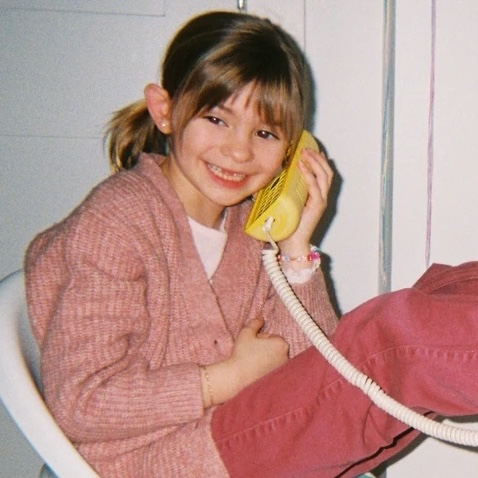
Some families are exploring a new, Wi-Fi-enabled landline phone that allows kids to communicate without screens. This blog explains how the phone works, why parents value its simplicity and built-in controls, and how groups of families are adopting it together to reduce pressure around smartphones. A parent conversation highlights shared buy-in, voice-only communication, and giving kids more independence while delaying personal devices.
READ MORE >
Today I’m rounding up six of the most-read blogs from 2025 so far. Stories and interviews that struck a chord with readers and offered real tools for parenting in the screen age. Whether you missed a few or want a quick refresher, I hope you’ll find something here that inspires a new conversation in your home, school, or community.
READ MORE >for more like this, DR. DELANEY RUSTON'S NEW BOOK, PARENTING IN THE SCREEN AGE, IS THE DEFINITIVE GUIDE FOR TODAY’S PARENTS. WITH INSIGHTS ON SCREEN TIME FROM RESEARCHERS, INPUT FROM KIDS & TEENS, THIS BOOK IS PACKED WITH SOLUTIONS FOR HOW TO START AND SUSTAIN PRODUCTIVE FAMILY TALKS ABOUT TECHNOLOGY AND IT’S IMPACT ON OUR MENTAL WELLBEING.
